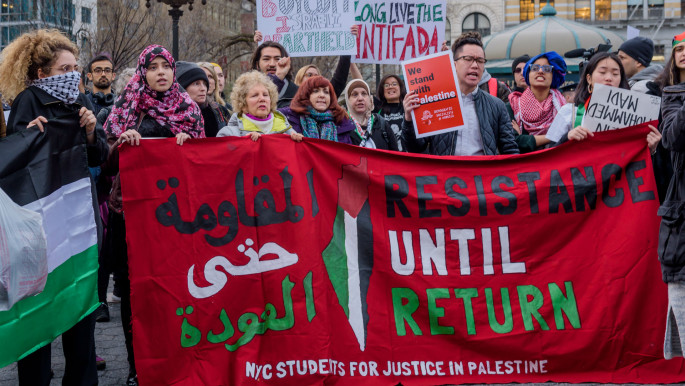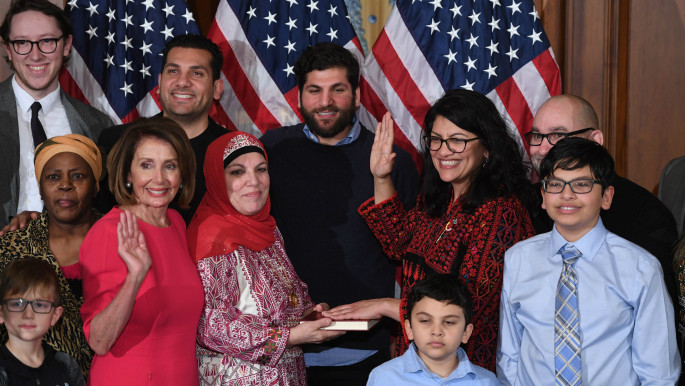
Angela Davis Palestine controversy shows how BDS supporters are being silenced
Despite announcing back in October that the civil rights activist, writer and lawyer was to be awarded the Fred Shuttlesworth Human Rights award, the BCRI has since stated it is withdrawing the honour, cancelling the gala also due to take place in February.
Their initial explanation was incredibly vague: "Upon closer examination of Ms Davis' statements and public record, we concluded that she unfortunately does not meet all of the criteria on which the award is based."
It is quite surprising that the leaders of an institute which has existed for 26 years and carries the responsibility of disseminating a rich, extensive archive of history on the civil rights movement in the US expects us to believe they just failed to do their homework on the political activity of those they give awards to. Especially with such a prominent figure as Angela Davis, who was famously active in the Student Nonviolent Coordinating Committee, the Black Power movement, and the US Communist Party - much of which made her the target of state violence.
In reality, this entire ordeal is not about a failure to complete more extensive research on her activism. It is mostly to do with her support of the Palestinian struggle for liberation and her endorsement of the Boycott, Divestment and Sanctions movement against Israel and all those involved in, and profiting from, the ongoing oppression and dispossession of the Palestinian people.
 |
|
| Read also: For Palestine: Top five BDS victories of 2018 |
Despite the lack of clarification over Professor Davis' supposed failures to effectively emulate the "ideals of the award namesake, Rev Fred Shuttlesworth" - a prominent civil rights activist who Davis actually knew before his death - local media reported the decision came after mounting pressure from pro-Israel individuals and organisations, including the Birmingham Jewish Federation.
Davis also shared similar information in a statement on social media: "Although the BCRI refused my requests to reveal the substantive reasons for this action, I later learned that my long-term support of justice for Palestine was at issue."
 |
Although the BCRI refused my requests to reveal the substantive reasons for this action, I later learned that my long-term support of justice for Palestine was at issue |  |
Jewish Voice For Peace expressed their anger over the entire affair, stating that it was both "shameful" and "outrageous".
Professor Davis said she was "stunned" by the BCRI board's reasons, especially given that her "own freedom was secured - and indeed my life was saved - by a vast international movement".
The writer and activist also rejected continued attempts to conflate pro-Palestine efforts with anti-Semitism, as she shared that her time spent with Jewish groups and communities throughout her life had been important in her "growing consciousness regarding the importance of protesting the Israeli occupation of Palestine".
It is difficult to comprehend how it is that Palestinian anti-colonialism is seen to be at odds with the struggle for civil rights. I cannot imagine that those who helped set up a space that was intended to espouse the very history of liberation, including Davis' own mother, would have limited those rights to the US border (or even within the country when the substantial population of Palestinian refugees is taken into consideration).
The institute, ironically, initially stated it was awarding Professor Davis for "giving voice to those who are powerless to speak". The institute, sadly, was unable to live up to the very qualities they admired so much in Davis, that they were willing to honour her for them. They gave in to repression and silencing.
Davis once said: "When one commits oneself to the struggle, it must be for a lifetime." She continues to live by those words and her example is one to learn from for all those involved in the fight against injustice.
Despite her access to international platforms, numerous celebrated publications, continuing to be one of the most recognisable faces in the world, and her historical role in the fight against racism, imperialism and capitalism today, she too is targeted by those who wish to discredit and silence the truth.
While attacks such as these may feel incredibly personal because the particular target is identifiable, it is part of a broader attempt to destroy a universalist solidarity that Angela Davis has helped strengthen.
As she described perfectly in her statement: "The rescinding of this invitation and the cancellation of the event where I was scheduled to speak was thus not primarily an attack against me but rather against the very spirit of the indivisibility of justice."
 |
The institute, ironically, initially stated that they were awarding Professor Davis for 'giving voice to those who are powerless to speak'. The institute, sadly, was unable to live up to the very qualities they admired so much in Davis... They gave in to repression and silencing |  |
Davis is of course not alone. This month also sees the swearing in of Ilhan Omar and Rashida Tlaib to the US Senate, both of whom have openly declared their support for the BDS movement and Palestinian liberation, which has seen them both denounced as racists and vilified in the press.
Read also: Ilhan Omar backs BDS amid facing anti-Semitism smear campaign
Similarly, when Marc Lamont Hill called for Palestine to be free "from the river to the sea" - the old slogan of the Palestinian people calling for the formation of one state for all its people between the River Jordan and the Mediterranean - he was denounced, sacked by CNN, and threatened with losing his job as a lecturer at Temple University.
Read more here: Axed CNN pundit supported basic Palestinian rights. What's so radical about that?
 |
|
| Read also: A historic day in Congress |
The same attacks were reserved for Black Lives Matter activists who visited Palestine on a solidarity trip and actively made the connection between their struggle against White supremacy in the US, and that of the Palestinians against Israeli Apartheid.
And as the leaked Al Jazeera documentary on the US Israel lobby has shown, black individuals are specific targets for criticism and delegitimisation in a - perhaps desperate - attempt to stop the BDS call from gaining a foothold in the organisations, churches, and political parties which have such a rich history of resistance against oppression.
Angela Davis herself famously described the struggle of our time to be captured by the '4 Ps': Prison, Police, Poverty, and Palestine.
She made the link between international and domestic issues, linking the defeat against racism and inequality at home with the defeat of imperialism and oppression abroad.
In that sense, the rescinding of the award represents a broader and ongoing argument in the US and around the world: can the struggle against reaction at home be effectively carried out without linking it effectively to reaction across the world. Davis' like has stood in the tradition that tells us as long as not everybody is free, none of us are free. And it is this tradition that we must carry with us, until liberation.
As James Baldwin reminds us in his letter to Angela Davis when she was incarcerated: "If they take you in the morning, they will be coming for us that night."
Malia Bouattia is an activist, a former president of the National Union of Students, and co-founder of the Students not Suspects/Educators not Informants Network.
Follow her on Twitter: @MaliaBouattia
Opinions expressed in this article remain those of the author and do not necessarily represent those of The New Arab, its editorial board or staff.




